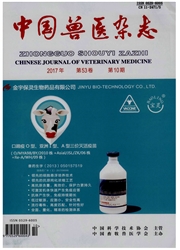

 中文摘要:
中文摘要:
耐药性是细菌适应性进化的结果,不合理的给药方案将导致耐药菌的过快增长,为了明确给药方案在突变耐药菌产生和富增上所发挥的作用,本试验利用体外药动模型研究了恩诺沙星不同给药方案对大肠杆菌突变耐药菌产生和富增的影响,结果表明,在药物消除半衰期和给药间隔相同的情况下,如果药物不能杀灭全部的病原菌,则给药浓度越高,耐药菌出现越早,且耐药强度越高。在药物浓度和给药间隔相同的情况下,药物消除越快,就更早地富集出耐药菌。耐药菌的耐药强度随着用药时间的延长而增强,且有阶梯增强的表现。在药物浓度高到一定值时,细菌会被全部杀死。且即使再提高药物浓度,也不能再加快杀灭细菌的速度。分析认为,给药方案和药动学特征对耐药菌的产生和富集都可能产生影响,这可能涉及很多复杂的细菌进化机制,需要进一步研究。
 英文摘要:
英文摘要:
Resistance was a result that bacteria adapted and evolved. Irrational dosage regimen would lead to rapid emergence of resistant bacteria.In order to define the effectiveness of dosage regimen on emergence and accumulation of resistant bacteria by mutation,it was investigated whether different dosage regimens of enrofloxacin affected emergence and accumulation of mutant resistant E. coli in vitro pharmacokinetic model. Results show that if all bacteria were not killed by enrofloxacin,the resistant bacteria would emerge earlier and the resistant strength would increase higher with higher dosing under the same dosing interval and rate of elimination,and so did it with greater rate of elimination under the same dosing interval and dosing. The accumulative level of resistant bacteria increased as time went by. The strength of resistance came stronger with the time extension. If the drugs concentration was up to a certain level,all the bacteria would be killed. And even the drug concentration increased,it would not accelerate the death of bacteria. Analysis suggests that the emergence and accumulation of resistance bacteria is affected by dosing regimen and pharmacokinetic characteristics. It may involve the evolutionary mechanism of bacteria,and how it works needs more investigation.
 同期刊论文项目
同期刊论文项目
 同项目期刊论文
同项目期刊论文
 期刊信息
期刊信息
